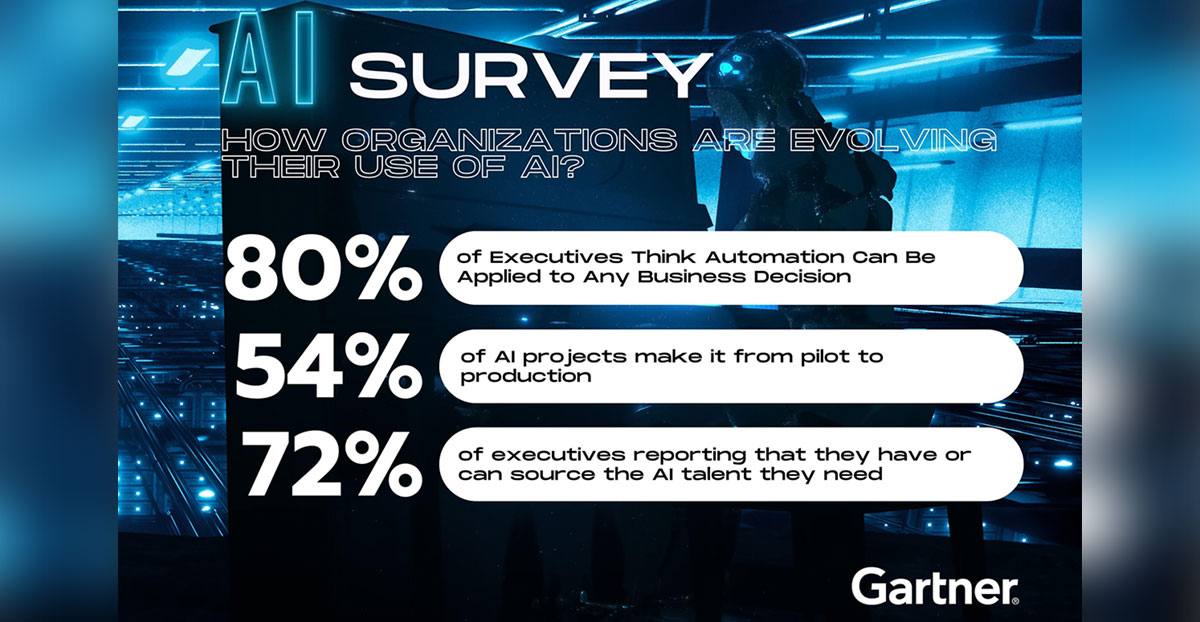- One-third of organizations are applying AI across several business units.
- On average, 54% of AI projects make it from pilot to production.
- Talent is not a significant barrier to AI adoption, with 72% of executives reporting that they have or can source the AI talent they need.
A recent survey by Gartner, Inc. found that 80% of executives think automation can be applied to any business decision. As automation becomes embedded in digital business, the survey revealed how organizations are evolving their use of artificial intelligence (AI) as part of their automation strategies.
“The survey has shown that enterprises are shifting away from a purely tactical approach to AI and beginning to apply AI more strategically,” said Erick Brethenoux, distinguished VP analyst at Gartner. “For example, a third of organizations are applying AI across several business units, creating a stronger competitive differentiator by supporting decisions across business processes.”
Organizations Still Challenged to Move AI From Pilot to Production
The Gartner survey revealed that on average, 54% of AI projects make it from pilot to production. This is a slight increase from the Gartner 2019 AI in Organizations Survey, which reported an average of 53% of AI projects that make it to production.
“Scaling AI continues to be a significant challenge,” said Frances Karamouzis, distinguished VP analyst at Gartner. “Organizations still struggle to connect the algorithms they are building to a business value proposition, which makes it difficult for IT and business leadership to justify the investment it requires to operationalize models.”
Forty percent of organizations surveyed indicated that they have thousands of AI models deployed. This creates governance complexity for the organization, further challenging data and analytics leaders’ ability to demonstrate return on investment from each model.
Talent Not a Significant Barrier to AI Adoption
While talent shortages are often assumed to impact AI initiatives, the survey found it is not a significant barrier to AI adoption. Seventy-two percent of executives reported that they have or can source the AI talent they need.
“The most successful organizations use a combination of in-house development and external hiring for AI talent. This ensures that the team renews itself continuously by learning new AI skills and techniques and considering new ideas from outside the organization,” said Brethenoux.
AI Security and Privacy Concerns Misplaced
Security and privacy concerns were not ranked as a top barrier to AI adoption, cited by just 3% of executives surveyed. Yet, 41% of organizations reported they have previously had a known AI privacy breach or security incident.
When asked which parties the organization was most worried about when it comes to AI security, 50% of respondents cited concerns about competitors, partners or other third parties, and 49% were concerned about malicious hackers. However, among organizations who have faced an AI security or privacy incident, 60% reported data compromise by an internal party.
“Organizations’ AI security concerns are often misplaced, given that most AI breaches are caused by insiders,” said Brethenoux. “While attack detection and prevention are important, AI security efforts should equally focus on minimizing human risk.”
More insights from the survey are available in the complimentary Gartner webinar, “The Gartner AI Survey Top 4 Findings.” Gartner clients can learn more in “TechWave: Artificial Intelligence Annual Survey Findings.”
Gartner Data & Analytics Summit
Gartner analysts are providing additional analysis on data and analytics trends at the Gartner Data & Analytics Summits 2022, taking place August 22-24 in Orlando, FL., September 14-16 in Tokyo, September 19-20 in Mumbai and November 7-8 in Sydney. Follow news and updates from the conferences on Twitter using #GartnerDA.
- องค์กรถึงหนึ่งในสามกำลังนำเทคโนโลยี AI มาใช้ในแผนกต่าง ๆ ของธุรกิจ
- โดยเฉลี่ย โครงการ AI ประมาณ 54% สร้างขึ้นมาจากสนามทดสอบไปสู่การนำมาใช้จริง
- บุคลากรไม่ใช่อุปสรรคของการนำ AI มาปรับใช้ ผู้บริหาร 72% ระบุว่ามีบุคลากรที่มีทักษะด้าน AI พร้อมอยู่แล้วหรือสามารถจัดหาบุคลากรที่มีทักษะ AI ในแบบที่ต้องการได้
การ์ทเนอร์เปิดผลสำรวจล่าสุด พบว่า 80% ของผู้บริหารคิดว่าระบบอัตโนมัติ (Automation) สามารถนำไปใช้ประกอบการตัดสินใจทางธุรกิจใด ๆ ก็ได้ โดยการสำรวจนี้เผยให้เห็นรูปแบบขององค์กรต่าง ๆ ที่กำลังพัฒนาการใช้เทคโนโลยีปัญญาประดิษฐ์ (AI) เมื่อระบบอัตโนมัติฝังตัวอยู่ในธุรกิจดิจิทัล โดยเป็นส่วนหนึ่งในกลยุทธ์ระบบอัตโนมัติขององค์กร
เอริค เบรทเดอนิวซ์ รองประธานฝ่ายวิจัยการ์ทเนอร์ กล่าวว่า “จากผลสำรวจดังกล่าวนี้แสดงให้เห็นว่าองค์กรต่าง ๆ นั้นกำลังเปลี่ยนแนวทางเชิงยุทธศาสตร์แบบเดิม ๆ ไปสู่ AI และเริ่มนำเทคโนโลยี AI มาใช้ในเชิงกลยุทธ์ขององค์กรมากยิ่งขึ้น ตัวอย่างเช่น หนึ่งในสามขององค์กรกำลังนำระบบ AI ไปใช้กับแผนกต่าง ๆ ในธุรกิจ เพื่อเสริมสร้างจุดแข็งและความต่างด้านการแข่งขัน และยังใช้ AI สนับสนุนการตัดสินใจในกระบวนการทางธุรกิจ”
องค์กรยังเผชิญความท้าทายกับการย้าย AI จากสนามทดสอบไปสู่การใช้งานจริง
จากการสำรวจของการ์ทเนอร์เผยว่า โครงการต่าง ๆ ด้าน AI เฉลี่ย 54% นั้นเกิดจากโครงการทดสอบต่าง ๆ ไปสู่การดำเนินงานจริง ซึ่งเพิ่มขึ้นเล็กน้อยจาก 53% ในปี 2562 ตามรายงาน Gartner 2019 AI in Organizations Survey
ฟราสซิส คารามูซิส รองประธานฝ่ายวิจัยการ์ทเนอร์ กล่าวว่า “การปรับสัดส่วน AI ให้เหมาะสมกับการดำเนินธุรกิจยังเป็นความท้าทายสำคัญ โดยองค์กรต่าง ๆ ยังประสบปัญหาการเชื่อมต่ออัลกอริธึมที่พวกเขาสร้างขึ้นกับคุณค่าของธุรกิจที่มอบให้กับลูกค้า (Business Value Proposition) ซึ่งกลายเป็นเรื่องยากสำหรับผู้บริหารฝ่ายไอทีและผู้บริหารธุรกิจในการวิเคราะห์และพิสูจน์ความคุ้มค่าของการลงทุนที่จำเป็นต่อโมเดลการทดสอบ”
องค์กร 40% ระบุว่ามีการนำแบบจำลอง AI หลายพันรายการไปใช้งาน ซึ่งสร้างความซับซ้อนให้กับการกำกับดูแลขององค์กรและยังเป็นความท้าทายต่อความสามารถของผู้บริหารด้านข้อมูลและการวิเคราะห์เพื่อแสดงผล ROI (Return On Investment) จากแบบจำลองแต่ละแบบ
บุคลากรไม่ใช่อุปสรรคสำคัญของการใช้ AI
แม้ปัญหาการขาดแคลนบุคลากรจะส่งผลกระทบต่อการริเริ่มโครงการ AI แต่จากผลสำรวจกลับพบว่า บุคลากรไม่ใช่อุปสรรคสำคัญในการนำ AI มาใช้ โดยผู้บริหารถึง 72% บอกว่า พวกเขามีบุคลากรที่มีทักษะด้านนี้พร้อมอยู่ในมือหรือสามารถจัดหาบุคลากร AI ที่มีความสามารถในแบบที่องค์กรต้องการได้
“องค์กรที่ประสบความสำเร็จมากที่สุดผสมผสานการใช้บุคลากรที่พัฒนาขึ้นจากภายในกับการว่าจ้างบุคคลภายนอกที่มีความสามารถและเชี่ยวชาญด้าน AI ซึ่งการดำเนินงานดังกล่าวนี้ทำให้มั่นใจได้ว่าทีมจะสามารถเดินหน้าทำงานได้อย่างต่อเนื่อง ด้วยการเรียนรู้ทักษะและเทคนิค AI ใหม่ ๆ รวมถึงไอเดียใหม่ ๆ ที่ได้มาจากบุคคลภายนอก” เบรทเดอนิวซ์ กล่าวเพิ่มเติม
ความกังวลด้าน AI กับความปลอดภัยและความเป็นส่วนตัวที่ผิดที่ผิดทาง
ความกังวลด้านความปลอดภัยและความเป็นส่วนตัวไม่ได้ถูกจัดอยู่ในอันดับต้น ๆ ของเรื่องอุปสรรคสำคัญต่อการนำ AI มาใช้ โดยมีผู้บริหารเพียง 3% เท่านั้นที่ระบุว่ารู้สึกกังวลกับประเด็นนี้ อย่างไรก็ตามองค์กร 41% เผยว่าเคยพบการละเมิดความเป็นส่วนตัวหรือเหตุการณ์ด้านความปลอดภัยของ AI มาก่อน
เมื่อถามว่าส่วนใดขององค์กรธุรกิจที่กังวลด้านความปลอดภัยของ AI มากที่สุด ผู้ตอบแบบสอบถาม 50% กังวลเกี่ยวกับคู่แข่ง คู่ค้า หรือบุคคลที่สามอื่น ๆ และ 49% กังวลเรื่องอันตรายจากแฮ็กเกอร์ อย่างไรก็ตามกลับมีถึง 60% ขององค์กรที่เผชิญกับปัญหาความปลอดภัยหรือเหตุการณ์ความเป็นส่วนตัวของ AI ที่เผยว่ามีการประนีประนอมในประเด็นของข้อมูลกันภายใน
“ข้อกังวลต่าง ๆ ในด้านความปลอดภัย AI ขององค์กรมักถูกเข้าใจผิด เนื่องจากการละเมิดที่เกิดจาก AI ส่วนใหญ่เกิดจากบุคคลภายใน ขณะที่การตรวจจับและป้องกันการโจมตีมีความสำคัญ ระบบความปลอดภัยของ AI ควรให้ความสำคัญกับการลดความเสี่ยงที่อาจเกิดขึ้นโดยมนุษย์ด้วยเช่นกัน” เบรทเดอนิวซ์ กล่าวสรุป
ข้อมูลเชิงลึกการสำรวจเพิ่มเติมสามารถคลิกอ่านได้ที่ “The Gartner AI Survey Top 4 Findings.” และลูกค้าการ์ทเนอร์สามารถเรียนรู้เพิ่มเติมได้ใน “TechWave: Artificial Intelligence Annual Survey Findings.”
Gartner Data & Analytics Summit
นักวิเคราะห์ของการ์ทเนอร์จะวิเคราะห์เพิ่มเติมเกี่ยวกับแนวโน้มด้านข้อมูลและการวิเคราะห์ในงาน Gartner Data & Analytics Summits 2022 ที่จะจัดขึ้นทั่วโลก โดยระหว่างวันที่ 22-24 สิงหาคม จัดที่เมืองออร์แลนโด รัฐฟลอริดา ระหว่างวันที่ 14-16 กันยายน จัดขึ้นที่กรุงโตเกียว ระหว่างวันที่ 19-20 กันยายน จัดขึ้นที่เมืองมุมไบ และระหว่างวันที่ 7-8 พฤศจิกายน จัดที่ซิดนีย์ ประเทศออสเตรเลีย ติดตามข่าวสารและความคืบหน้าการประชุมผ่านทาง Twitter โดยใช้แฮชแท็ก #GartnerDA
